From the annual DC Zinefest—now in its fourth year—to small publications getting big attention from national press, independent publishing in print continues as a culture and a creative community. We caught up with three D.C. zinesters to find out more.
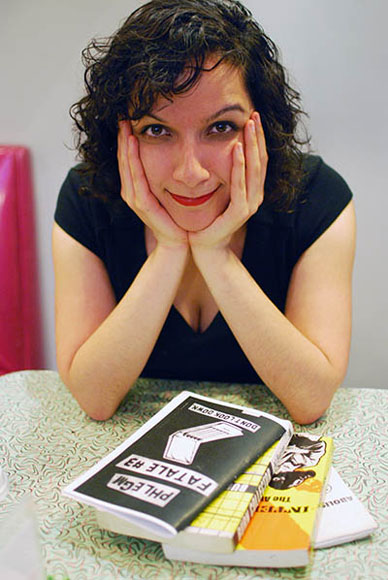 Name:
Name: Ariana Stone
Zines: Writes Phlegm Fatale; organizes DC Zinefest
Get her work at: DC Zinefest, Red Emma’s in Baltimore, the Wooden Shoe in Philadelphia
What is a zine?
Zines are independent magazines most simply that are small in production — [they] should be pretty small in quantity of issues and all self-produced.
Looking back, zines seem like precursors to blogs in the ‘90s. Now that digital culture is such a large part of work and social life, what’s the role of zines?
I like the tangible aspect of zines, and I think I appreciate it in a different way than the older zinesters do, because I’m so inundated with the internet and obsessed with my phone and with social media.
For me reading a zine is a way to step back from all the white noise of technology, but for someone who started doing zines in the early 90s it was a way to initiate social contact that was missing.
Reading a zine — I associate it with relaxation. It’s my way to disconnect and put down my phone, turn off the TV, curl up in my bed or in the tub with a nice thick zine and relax. And it’s shorter than a book, which I like. I don’t have the attention span for a book; maybe that’s also because I was born in 1990.
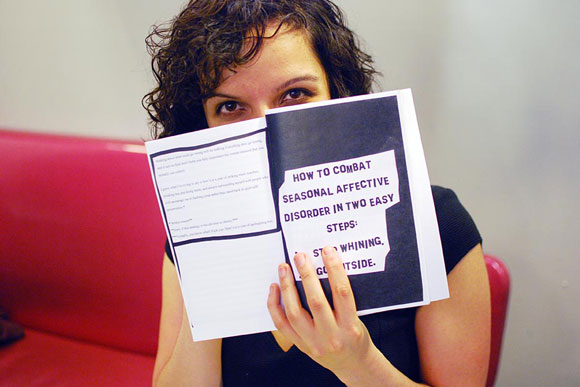 Where can you get zines in D.C.?
Where can you get zines in D.C.?
D.C.’s kind of sad in that regard; it’s really unfortunate. Smash Records in Adams Morgan has a small collection, but that’s one of the only places I can think of. And then there’s Zinefest, which seems to be the number one way that people sell zines.
It’s not so much that there’s not interest in zines in D.C., but having a space for them is so expensive and complicated they don’t last very long. The cost of living and renting is so high that it’s quite difficult to maintain anything for more than a year or so.
How would you characterize the zine scene in D.C.?
In D.C. the zine community is extremely politically correct. Some people think that’s a pejorative, but I think it’s kind of cool and a good thing because it’s a very inclusive intentional community that thinks a lot about making everyone feel welcome and comfortable.
Our zinefest has a pretty stringent safer spaces policy, so we review all the material that tablers submit, and we denied people last year for having content that we perceived to be racist or sexist or homophobic or ableist. We got a lot of pushback from that, from tablers and also other zinefest organizers, because they argued that we shouldn’t be censoring or gatekeeping so heavily.
But our view was it’s our zinefest — this is the world that we want to see, so it’s up to us to make the zinefest whatever we want it to be.
"It’s our zinefest — this is the world that we want to see, so it’s up to us to make the zinefest whatever we want it to be."
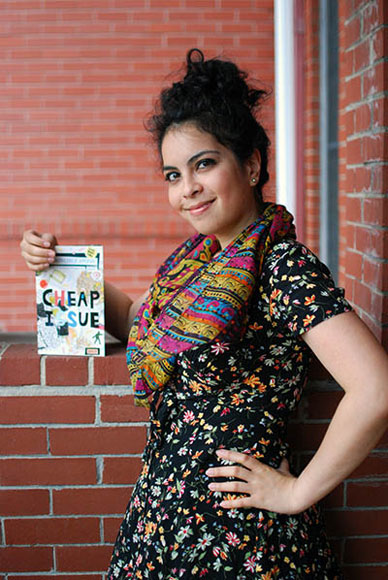 Name:
Name: Malaka Gharib
Zine: The Runcible Spoon, a zine about food and fantasy
Get it at: Each Peach Market, Qualia Coffee, Seasonal Pantry, Treasury Vintage, Etsy (
https://www.etsy.com/people/runciblespoonzine)
Your newest edition is called the Bland Issue. When did it come out?
It came out on April 28, for the Food Book Fair and the Brooklyn ZineFest. We sold a lot of magazines and a lot of people loved it. The caliber of artists and writers that we get for each issue just continually surprises me because part of me wants to say, “Guys, you know this is just a little zine, it’s not like a magazine, it’s a little thing.” But they make it really good. So I’m very proud of this issue.
It sounds like writers and creatives are really seeking you out to get involved.
I think the concept of food and fantasy really resonates with people – not fantasy in a sexual way, but just the fantasy of daydreaming about food. Sometimes if you’re really hungry and you’re just like, “It would be so amazing if I could have the most luscious slice of chocolate cake with raspberry coulis and cold ice cream and a hot cup of steaming Viennese coffee.” The way that people talk about food like that, it interests me and I think people latch onto that fantastical concept.
And we strive to be a little ugly and a little cute, like salty and sweet, but never snarky, and always inclusive.
How does the ugliness come out?
We have absolutely no design concepts whatsoever. We just sort of paste everything together by hand, and it’s not beautiful design. Designers have told us,
I want to be a little gritty. I want The Runcible Spoon to be very in touch with its zine roots. Zines are very DIY and handmade and they are not cute, so we try to be a little ugly.
You talked earlier about making the tone of the Runcible Spoon inclusive. What does inclusion mean to you?
It’s food for the people. We’re not going to tie you to financial constraints; we’re not going to talk down to you when we talk about food. Food for us is about fun and it’s for everyone.
Your content isn’t available online. Why not?
I think of zines almost as an art installation. The content cannot be interpreted in any other format than the magazine itself. Once I’ve put this in a PDF online, you’ve lost the translation of what it’s supposed to be. I don’t intend for people to read it online. Not being able to flip through it and digest it, or look at it or peer or scan around with your hands, you lose it. You lose what I was intending for you as a reader to get.
How do zines interact with internet culture?
We integrate the theme of the Internet a lot in our work. In this issue we have Martha Stewart’s pictures from Twitter that she’s taken of foods, and it’s called #struggleplate. Another thing we have is this one that I did, called “How to make cream of wheat cool on social media using Upworthy-style headlines.” Lots of Internet themes in here. I think it’s kind of funny to bring these two worlds together.
Anything else you’d like to say about the latest edition?
Don’t think that because it’s called Bland that all the recipes are going to be gross. Obviously the word is interpreted in a multitude of different ways. We have some disgusting recipes in there.
But we also have a lot of recipes that are good, like a great recipe for yogurt sauce with chicken, and another really great recipe for Hainanese chicken and rice, which is really flavorful. It’s all white, so it looks like it’s going to be really bland. But then you taste a bite and it’s like a ginger coconut explosion!
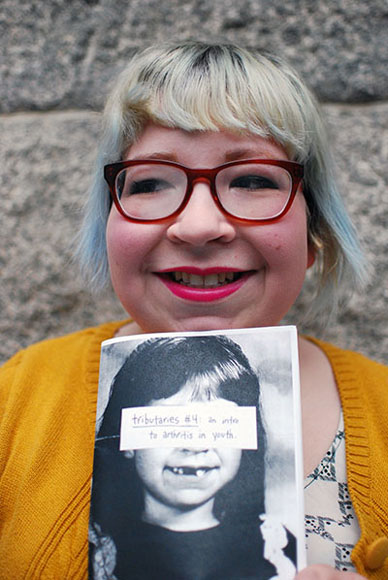 Name:
Name: JC Parker
Zines: Tributaries, Collide
Get them at: Etsy (
http://www.etsy.com/shop/tributarieszine), Stranger Danger zine distro (Chicago), Mend My Dress Press (Takoma, Wash.), Atomic Books (Baltimore), Zinefests
What are your zines about?
My personal zine is called
Tributaries, and it centers around my experience growing up with juvenile rheumatoid arthritis and what it’s like to be a young person with a disability.
I also do a compilation zine called
Collide, which I just started last year. It’s essays from people who are living with some kind of chronic physical illness and also a mental illness.
Collide started because that’s something I wanted to read about, as someone who identifies as having physical disability and a mental illness. I had never seen a piece of writing, at least in zines, which talked about both.
Did most of the entries come from people who were already in the zine community?
Yes, but two people who wrote for this one, I’ve never met before. They do write zines, but had never talked about their illnesses from this angle. I think it’s really brave to step out for the first time, especially if you’re not someone who people associate with talking about disability.
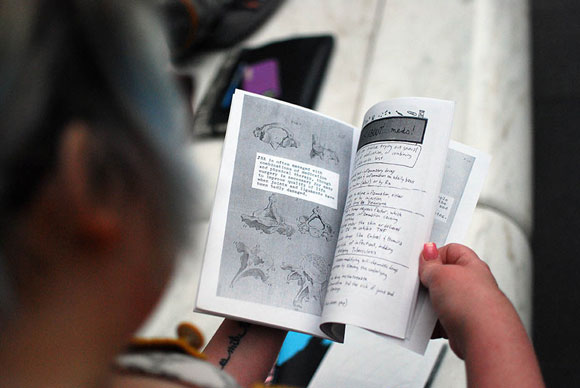 It’s almost like a coming out moment in some ways.
It’s almost like a coming out moment in some ways.
It can be, for sure. I’ve shared my personal zine with my mom; in that one I talk about having foot surgery right after I graduated college. She was taking care of me through a lot of that time, so it felt natural to share a lot of that with her because she was present.
But I think with depression and anxiety, I almost felt guilty telling her how shitty I had felt for a long time. So I waited to show her [
Collide] for quite a while and didn’t tell her about it.
Why use zines to transmit this kind of message? We have a lot of mediums in the digital age – why are zines compelling?
As a librarian, I certainly don’t romanticize the printed object. I understand the value of digital texts, but for me zines are an instant way to connect with someone, put something in their hands, have them pass it around. I like sharing [zines] with people. I like putting things out that aren’t on the internet.
Why?
It feels nice that I’m revealing all of these things now, but if in ten years maybe if I don’t want to be talking about my breakup with someone or the particular way I felt about a situation that I don’t feel anymore, it’s not online. It’s just in this bit of ephemera that people I know may keep.
This year’s zinefest is on August 9 at St. Stephen’s Episcopal Church. Get updates from the organizers at dczinefest.wordpress.com.
These interviews have been edited and condensed.